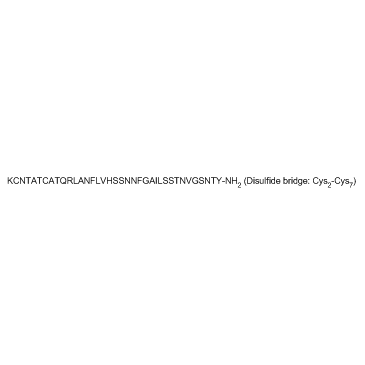| Description |
Amylin, amide, human, a 37-amino acid polypeptide, is a pancreatic hormone cosecreted with insulin that exerts unique roles in metabolism and glucose homeostasis.
|
| Related Catalog |
|
| In Vitro |
Amylin, amide, human (Human Amylin) is a pancreatic peptide cosecreted with insulin from the β-cells in the Langerhans islets. Human Amylin is an unique hormone exerting a complex network of physiologic functions, such as regulation of β-, α- and δ- cells secretion, inhibiting glucagon, somatostatin and β-adrenoceptor-induced insulin secretion, gastric emptying, decrease in glycemia, increase in lactate production, decrease in glycogen synthesis and glucose uptake in muscle. To further characterize the effect of the polyethylene glycol (PEG) moiety on recognition by the co-receptors, the response to PEGylated human Amylin is evaluated in cells. MCF-7 cells endogenously express human Amylin receptor CTR1 and CTR2. Stimulation of the receptor with Amylin results in the production of cAMP. The free, non-conjugated human Amylin results in an EC50 of 35.2±7.5 nM (r2=0.990), and the PEGylated human Amylin results in a EC50 of 30.8±6.7 nM (r=0.988)[1].
|
| In Vivo |
The pharmacological activity of the PEGylated human Amylin is evaluated by three assays: the pharmacokinetics, the modulation of glycemia and the modulation of glucagon. The free and the PEGylated human Amylin are injected by subcutaneous route in separated groups of swiss male mice. At given time intervals, the bioavailability of Amylin in serum is evaluated by ELISA. Amylin has a short half-life (t1/2) of approximately 15-20 minutes and thus a sustained release of Amylin of an increasing in its t1/2 would serve as potential strategies for the restoration of basal hormone levels. A typical PK curve is observed for the free Amylin, with a half-time of 23 min. The PEGylated Amylin shows a slower decrease in disappearance rate from plasma, resulting in a half-life of 179 min, 7.8 times greater than the unmodified Amylin[1].
|
| Cell Assay |
The production of cAMP in response to stimulation with non-conjugated or PEGylated human Amylin is acessed in MCF-7 cell lines. The assay is performed in 96 well half area plates, in a total reaction volume of 20 μL/well, with a total of 3.000 cells in suspension (after optimization for optimal seeding density and format: adherent or suspension), freshly thawed. Cells are incubated at 37°C in a humidified atmosphere with 5% (v/v) CO2. For stimulation, cells are incubated for 30 minutes at 37°C in HBSS supplemented with 20 mM HEPES (pH 7.4) and 500 μM IBMX (phosphodiesterase inhibitor) in the presence of non-conjugated human Amylin (0.001 nM, 0.01 nM, 0.1 nM, 1 nM, 10 nM, 100 nM, 1000 nM, 10 μM, 100 μM, and 1000 μM) vs. PEGylated human Amylin[1].
|
| Animal Admin |
Mice[1] Swiss male mice (8 weeks old; n=4 per group) are administrated of free or monoPEGylated human Amylin (both at 400 μg peptide/kg body weight) by subcutaneous route. At the indicated time interval, blood is collected with glass capillary tubes from retro-orbital access and the serum is separated. The concentration of Amylin in the plasma is evaluated by ELISA. The sensitivity of the ELISA assay kit for the monoPEGylated human Amylin product is similar to the non-conjugated human Amylin as inferred from control analytical curves. In case needed, the mice plasma samples are diluted accordingly in order to achieve the desired concentration range of the ELISA kit. Glucagon is evaluated from the same serum samples, by using an ELISA kit[1].
|
| References |
[1]. Sisnande T, et al. Monoconjugation of Human Amylin with Methylpolyethyleneglycol. PLoS One. 2015 Oct 8;10(10):e0138803.
|
